Chobe River Clean-Up
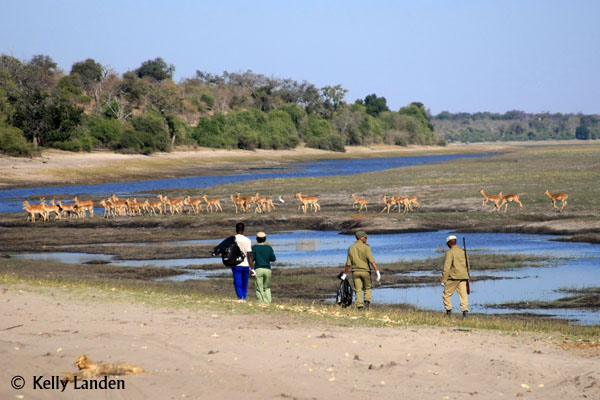
Chobe river bank clean up, a success!
On Thursday, Aug 5th, Elephants Without Borders joined forces with the Department of Wildlife and National Parks (DWNP) to walk the shores of the Chobe River within Chobe National Park to pick up garbage and debris that had been deposited from the now receding flood waters. Upstream, the river runs along many villages through the countries of Angola and Namibia. With the wet season rains, the river quickly rises several meters, widening, and in its current, taking whatever is in its path with it. Some years it is devastating. When it finally subsides and recedes during the dry season, debris is left along the Chobe shores. Taking pride in Botswana and our national parks, we decided to ensure that the banks were clean and no harm would come to wildlife due to the deposited debris.
The idea to conduct this activity came to me when in the park, along the river, I watched a young elephant pick up an old beer bottle and was carrying and tossing it around in his trunk.
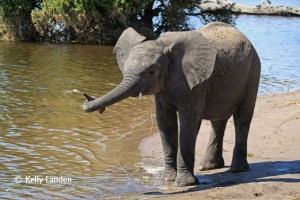
May look cute, but not so funny
It brought back memories of a few elephants that had died when they consumed too many plastics. Not long ago, the Kasane garbage dump was unfenced and was known to be a common place to view wildlife such as elephants, hyenas, baboons, etc. foraging through heaps of raw, burning trash: plastics, bottles, old food, household items, etc. Commonly seen was a group of bull elephants rummaging through the rubbish, tossing full plastic bags about, as if it were the earth’s soils that they cover themselves with. It must’ve been hot within the burning heaps and I wondered what kind of damage they were accruing on their feet and in their digestive tracts.
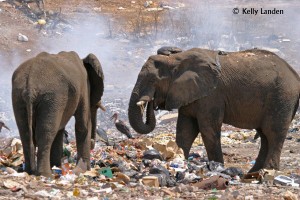
2 Bulls in the old Kasane garbage dump, adorned w plastic
Taken from the Mmegi Oct 30, 2008: “The dumping site has had serious ramifications on the environment and the wildlife of Chobe. Elephants, hyenas, baboons and birds flock to the dumping site to feed. This year, three elephants have died after eating plastics from the dump site. The principal wildlife warden in Kasane,
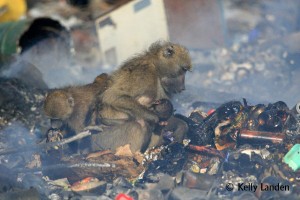
Mother Baboon w babe in burning trash
Thunya Sedodoma said that last year, plastics were found in the belly of a dead elephant. She added they have not managed to establish what killed a number of elephants because the carcases were too decomposed by the time they were found. Sedodoma asserted that this year, they have recorded over 70 deaths of wildlife, all related to feeding at the dumping site. She said it is common to see plastics in elephants’ faeces and this means many of the beasts feast at the dumping site. The plastics are causing the elephants to defecate abnormally.”
She was right. It was not uncommon to see plastics scattered within the elephant dung within the park. However, with great relief, the Kasane garbage dump is now a monitored landfill complete with compactors to bury the rubbish. It is cleaned up, fenced and electrified to keep the wildlife out. And it seems to be working well. However it is not to say that all the garbage can be contained, as wind, water and careless people still spread it about. It just takes a little initiative and time to help cleaning it up.
dung and plastic, a detrimental combination
When I approached Dr.Gaseitsewe Masunga, the Chobe District Wildlife Coordinator about conducting the walk as a team, he was enthusiastic and organized to have several DWNP staff join us. We started at the old Entrance gate, spread out across the flood plains, and walked as far as we could in one day, to the Ihaha campsite.
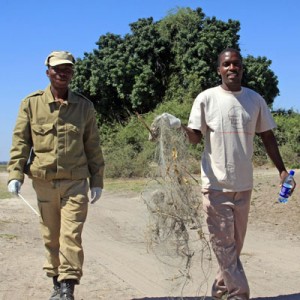
fishing nets are a real wildlife hazard
We collected 2 full truck loads of bottles, cans, plastic bags, glass, knotted fishing nets, shoes, boards with nails, broken mekoros, etc. The afternoon it became hot and the extent was tiring, but still it was fun. Enjoyable to watch was the expression and curiosity of the onviewing wildlife as we passed. The giraffe were especially curious, but the hippos didn’t give us the time of day!
It was a successful and satisfying endeavor, and seemed that everyone enjoyed doing it. Together it was almost effortless! We want to sincerely Thank the DWNP staff for joining EWB and we look forward to future activities together. To read more about EWB activities, check out our News page at http://www.elephantswithoutborders.org/news.php or become our friend on facebook at http://www.facebook.com/pages/Elephants-Without-Borders/220139555561
Support EWB at http://www.elephantswithoutborders.org/donate.php
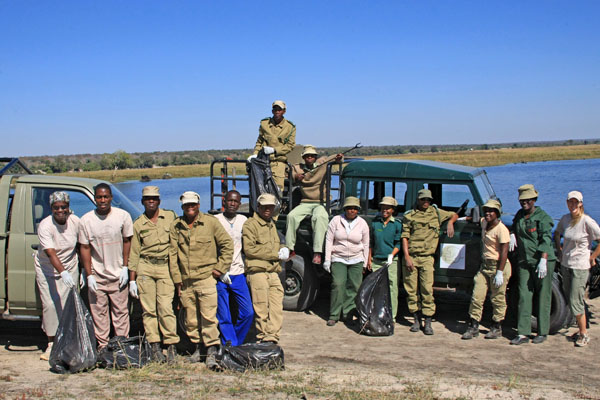
EWB and DWNP clean-up crew... Go Team!
Tags: africa, botswana, chobe, conservation, elephants, elephants without borders, floods, research, wildlife







